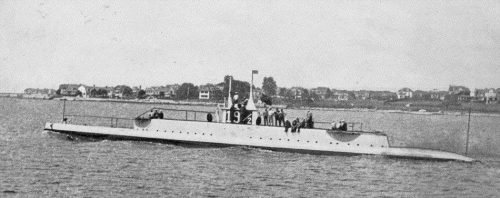

G4 1912
| No | Name | Yard No | Builder | Laid down | Launched | Comm | Fate |
| SS19½, 1920- SS20 | G1 (ex-Seal) | 119 | Newport News | 2.1909 | 8.2.1911 | 10.1912 | stricken 3.1920 |
| SS26 | G4 (ex-Thrasher) | 354 | Cramp, Philadelphia | 7.1910 | 15.8.1912 | 1.1914 | stricken 9.1919 |
| SS27 | G2 (ex-Tuna) | 120 | Lake, Bridgeport | 10.1909 | 10.1.1912 | 2.1915 | stricken 4.1919 |
| SS31 | G3 (ex-Turbot) | Lake, Bridgeport | 3.1911 | 27.12.1913 | 3.1915 | stricken 5.1921 |
|
Displacement standard, t |
|
|
Displacement normal, t |
SS19½, 27: 400 / 516 SS26: 360 / 457 SS31: 393 / 460 |
|
Length, m |
49.1 |
|
Breadth, m |
4.00 |
|
Draught, m |
3.80 |
|
No of shafts |
2 |
|
Machinery |
SS19½, 27: 4 White & Middleton petrol engines / 2 electric motors SS26: 2 Fiat petrol engines / 2 electric motors SS31: 4 Busch-Sulzer diesels / 2 electric motors |
|
Power, h. p. |
SS19½, 27: 1200 / 520 SS26: 1000 / 400 SS31: 1200 / 600 |
|
Max speed, kts |
SS19½, 27: 14 / 10 SS26, 31: 14 / 9.5 |
|
Fuel, t |
SS19½, 27: petrol 35 SS26: petrol 22 SS31: diesel oil 39 |
| Endurance, nm(kts) |
SS19½, 27, 31: 2500 (8) / 70 (5) SS26: 1680 (8) / 40 (5) |
|
Armament |
SS19½: 6 - 450 TT (bow, 6) SS26: 4 - 450 TT (bow, 8) SS27: 4 - 450 TT (bow, 4) SS31: 6 - 450 TT (bow, 10) |
|
Complement |
SS19½, 26, 27: 24 SS31: 25 |
|
Diving depth operational, m |
60 |
Project history: This was a group of single designs, out of the mainstream of US submarine development: G1, G2 and G4 were the last USN submarines powered by petrol engines. All three experienced engine trouble, the Lake craft apparently due to the use of four engines and weak engine foundations, the Cramp boat due to light machinery installation. As a result, the forward engines were removed from G1 and G2 had to be returned to Lake for further trials. G1 was a Lake design, whose contract was awarded parallel to those for C2-C5 and D1-D3, under the Act of March 1907. She was purchased only after considerable agitation for competition in submarine design, and in fact no submarines were requested at the time she was bought. She was, therefore, essentially a private-venture boat, and she was unique in the US Navy in having a fractional hull number, changed to a whole number only after the ship bearing it had been lost in 1917. The Lake G2 was bought the following year (Act of May 1908) with the American Laurenti G4. The Lake G3 was bought under the Act of March 1909.
The contract for G1 provided that she would be purchased only if she could prove the equal of the best boat then owned by the US government, which, at the time of the agreement, was the Octopus (C1). She was completed in 1912, almost 2.5 years overdue; G2 was similarly late, apparently due in part to the failure of the original Lake Company, which reorganised in 1915 as the Lake Torpedo Boat Company.
Except for the light construction of the diving plane supports and the stern arrangement, G1 was considered satisfactory. She had an unusual feature, a watertight superstructure above the pressure hull. This did not add to sea-keeping abilities, and it was deleted from later Lake-designed craft.
G4 suffered from both structural and machinery problems, and was almost three years overdue. Her surface range was 1680nm at 8kts and the underwater range was only 40nm at 5kts. Laurenti employed pressure hulls which were not circular in section, and consequently had to use extra framing to brace them; that in turn made his submarines overweight.
Modernizations: 1915, G1: 2 petrol engines were removed (600 / 520 hp).
Naval service: No significant events.

G1 1917
© Ivan Gogin, 2014